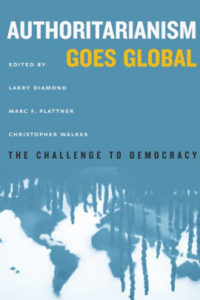Democracy in retreat: ‘ominous’ decline around the world, says Freedom House

Freedom House
Democracy is undergoing an ‘alarming’ decline around the world, according to the latest annual survey from Freedom House.*
The country-by-country report – Freedom In The World 2019 – paints a dismal picture of recent trends, citing diminishing political rights and civil liberties in 68 countries with gains in only 50. Of 195 countries assessed, 86 (44 percent) were rated Free, 59 (30 percent) Partly Free, and 50 (26 percent) Not Free.
“The overall losses are still shallow compared with the gains of the late 20th century, but the pattern is consistent and ominous,” the report states. “Democracy is in retreat.”
 Two countries experienced dramatic declines in 2018, the report adds. Hungary fell from “Free” to “Partly Free” status as Prime Minister Viktor Orban’s government “presided over the most dramatic decline ever charted by Freedom House within the European Union.” Nicaragua dropped to “Not Free” status following “a ferocious crackdown on a nationwide anti-government protest movement.”
Two countries experienced dramatic declines in 2018, the report adds. Hungary fell from “Free” to “Partly Free” status as Prime Minister Viktor Orban’s government “presided over the most dramatic decline ever charted by Freedom House within the European Union.” Nicaragua dropped to “Not Free” status following “a ferocious crackdown on a nationwide anti-government protest movement.”
Syria, South Sudan, Eritrea, Turkmenistan and North Korea registered the worst freedom ratings, while Finland, Norway, Sweden, Canada and the Netherlands scored highest. States that made positive progress in their freedom rating included Armenia, Ethiopia and Iraq.
“This is the thirteenth consecutive year in the decline in political rights and civil liberties globally,” said Freedom House president Michael Abramowitz. The report cites Russia, Iran, Azerbaijan, Montenegro, Serbia, Hungary, and three former Soviet Central Asian states for contributing to the “ominous” decline.
 Authoritarianism is increasingly a cross-border enterprise, Freedom House adds.
Authoritarianism is increasingly a cross-border enterprise, Freedom House adds.
Russia and Iran are among a growing number of regimes that are “reaching beyond their borders to target expatriates, exiles, and diasporas.”
Some 24 states, including Russia, China, Turkey, Iran, and Saudi Arabia, “have recently targeted political dissidents abroad with practices such as harassment, extradition requests, kidnapping, and even assassination,” it notes.
Abramowitz said that the drivers of decline are starting to shift, Slate reports.
“What you’re seeing the last year or two is more established democracies suffering declines in institutions and norms, particularly countries that had been improving had heading toward stronger democracy heading back,” he says.
“We cannot take for granted that the institutional bulwarks against abuse of power will retain their strength, or that our democracy will endure perpetually,” Abramowitz wrote. “Rarely has the need to defend its rules and norms been more urgent.”
 Declining standards in established Western democracies have a knock-on effect for efforts to advance democracy, the report adds.
Declining standards in established Western democracies have a knock-on effect for efforts to advance democracy, the report adds.
“There should be no illusions about what the deterioration of established democracies could mean for the cause of freedom globally,” it notes. “That major democracies are now flagging in their efforts, or even working in the opposite direction, is cause for real alarm.”
The crisis is linked to a changing balance of power at the global level, the report observes:
The share of international power held by highly industrialized democracies is dwindling as the clout of China, India, and other newly industrialized economies increases. China’s rise is the most stunning, with GDP per capita increasing by 16 times from 1990 to 2017. The shift has been driven by a new phase of globalization that unlocked enormous wealth around the world. The distribution of benefits has been highly uneven, however, with most accruing to either the wealthiest on a global scale or to workers in industrializing countries.
 “Of the 41 countries consistently ranked Free from 1985 to 2005, 22 have registered net score declines in the last five years,” Slate adds:
“Of the 41 countries consistently ranked Free from 1985 to 2005, 22 have registered net score declines in the last five years,” Slate adds:
The poster child for this trend is Hungary—which thanks to Prime Minister Viktor Orban’s attacks on the free press, independent NGOs, academia, and the rights of migrants—dropped from “free” to “partly free” in this year’s report, making it the first non-free member of the European Union ever recorded. Serbia, an EU candidate state, also dropped to partly free. Slovakia and Montenegro both saw significant declines in their scores.
The Freedom House report gives at least two reasons for continuing alarm, the NY Times adds:
The first is that it usually takes more than two years for a democracy to collapse. “Elsewhere in the world, in places like Hungary, Venezuela or Turkey, Freedom House has watched as democratic institutions gradually succumbed to sustained pressure from an antidemocratic leadership, often after a halting start,” the report said. …..
 was among the countries that received praise due to “a breakthrough” victory for “reform-minded” opposition leader Nikol Pashinian, who became prime minister in 2018 through early elections called “after unpopular incumbent [Serzh Sarkisian] attempted to evade term limits and extend his rule,” RFE/RL notes.
was among the countries that received praise due to “a breakthrough” victory for “reform-minded” opposition leader Nikol Pashinian, who became prime minister in 2018 through early elections called “after unpopular incumbent [Serzh Sarkisian] attempted to evade term limits and extend his rule,” RFE/RL notes.
The report said that Armenia’s transition serves as “a reminder that people continue to strive for freedom, accountability, and dignity, even in countries where the odds of success seem insurmountable.”


Nenhum comentário:
Postar um comentário